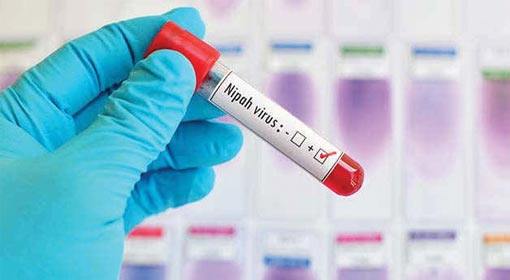Kozhikode: The outbreak of the deadly Nipah virus has caused havoc in Kerala, killing 16 people. While 6 patients are in a serious condition, at least 25 others have been admitted under suspicion and are currently being treated. The Kerala Health Department has declared a high alert and the Central Government has enforced a special team of doctors in Kerala, as reported by the Union Health Minister, J.P Nadda. Back in 2001, 50 people had died due to the spread of Nipah virus in West Bengal.
 Two weeks ago, it was found that 3 members of the same family had been infected by the Nipah virus. It is suspected that these people consumed fruits from a tree, known to be a home for ‘Fruit Bats’. Later, it was reported by the Kerala Government that 16 people had died in Kozhikode due to this epidemic until Sunday. Apart from this, 25 people are being treated under the suspicion of being infected by the Nipah Virus.
Two weeks ago, it was found that 3 members of the same family had been infected by the Nipah virus. It is suspected that these people consumed fruits from a tree, known to be a home for ‘Fruit Bats’. Later, it was reported by the Kerala Government that 16 people had died in Kozhikode due to this epidemic until Sunday. Apart from this, 25 people are being treated under the suspicion of being infected by the Nipah Virus.
“We’re diagnosing everybody, the ones who are deceased or in contact with the persons suspected to have contracted the Nipah Virus (NiV). An independent provision has also been made for this. The hospitals attached with the Kozhikode Medical College have been instructed to reserve a special ward for this purpose. Patients suspected with the early symptoms of the NiV have been asked to be admitted to these hospitals”, such was the information reported by the Kerala Health Minister, Shailaja.
Considering the gravity of the Nipah Virus outbreak in Kerala, the Central Government sent a special team of doctors and experts that reached the spot on Monday. The blood samples of all the suspected patients have been sent to the ‘National Institute of Virology’ in Pune.
The widespread of Nipah virus in the Southeast Asian country, Malaysia had killed about 300 people in 1999. Whereas Bangladesh, has been hit by this epidemic for 5 times in total so far. There isn’t an antidote available for this disease as yet and hence, the only solution for it is to treat the patient in the ‘Intensive Support Care’, as reported by the World Health Organisation.







